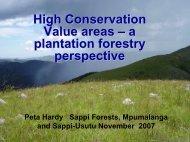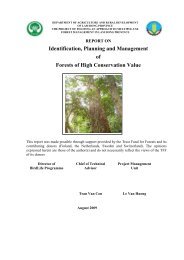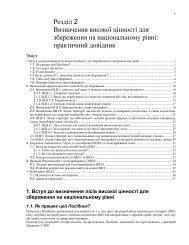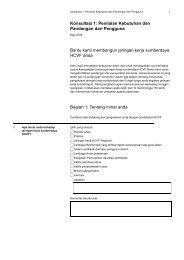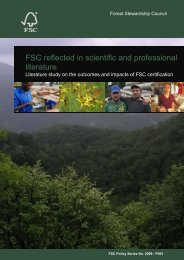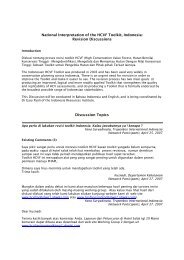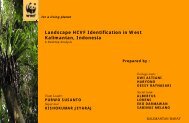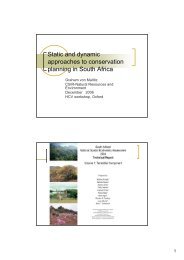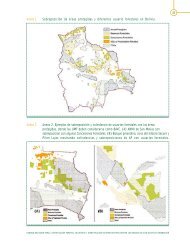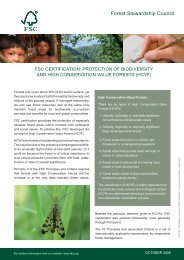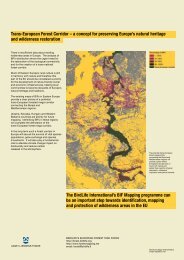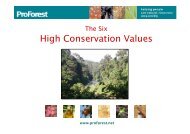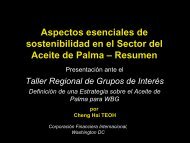Forests Sourcebook - HCV Resource Network
Forests Sourcebook - HCV Resource Network
Forests Sourcebook - HCV Resource Network
Create successful ePaper yourself
Turn your PDF publications into a flip-book with our unique Google optimized e-Paper software.
■<br />
■<br />
■<br />
■<br />
■<br />
■<br />
■<br />
■<br />
■<br />
Community forestry programs should make rich forest<br />
resources available to communities for their use, not just<br />
heavily degraded forests (see box 1.14).<br />
Transparency in payments to communities is critical.<br />
Governments or companies should make sure that villagers<br />
are informed of payments made to traditional village<br />
leaders, of amounts paid, and of the intended use for<br />
the payments, to limit corruption.<br />
Both communities and government should benefit from<br />
community forestry projects. Community benefits are<br />
more likely to accrue in situations where commercially<br />
viable forest resources, including NTFPs, are available.<br />
Governments benefit from expanded collection of taxes<br />
and forest fees and from cost savings resulting from a<br />
reduction in enforcement.<br />
Solid feasibility studies and business plans need to be in<br />
place, and communities should be familiar with market<br />
conditions. While financial returns should be quick to<br />
materialize, this should be balanced with longer-term<br />
needs of investing in infrastructure, natural resource<br />
conservation, and at times primary and secondary processing<br />
of wood and marketing of end products. Local<br />
knowledge, science, and institutions are often ignored or<br />
treated with derision by outsiders, making it difficult to<br />
incorporate local knowledge into activity design.<br />
It is essential that markets be made to work for the poor<br />
and that market failures, such as monopolies, collusion,<br />
segmentation, asymmetrical information, and power, are<br />
overcome. This means responding to market failures and<br />
imperfect competition and identifying new opportunities<br />
that take advantage of the assets of the poor, such as<br />
labor and natural resources.<br />
Project support should include management capacity<br />
building for the community administration. In addition<br />
to technical skills, training should cover participatory<br />
planning, monitoring, and periodic updating of community<br />
development plans.<br />
Individual families should be supported. Collective<br />
activities are not always the best approach for community<br />
forestry, especially tree planting activities—<br />
smallholder farmers should be supported in this process.<br />
In addition to traditional management of highly stocked<br />
forests, secondary forests and low-density woodlands<br />
offer good opportunities for community management,<br />
because they offer multiple agroforestry services and<br />
higher flexibility for forest management.<br />
Customary claims and particular rights of Indigenous<br />
Peoples and other forest-dependent communities should<br />
be addressed.<br />
SELECTED READINGS<br />
Agrawal, A., and C. Gibson, eds. 2001. Communities and the<br />
Environment: Ethnicity, Gender, and the State in<br />
Community-Based Conservation. Piscataway, NJ: Rutgers<br />
University Press.<br />
Gibson, C. C., J. T. Williams, and E. Ostrom. 2005. “Local<br />
Enforcement and Better <strong>Forests</strong>.” World Development 33<br />
(2): 273–84.<br />
Ostrom, E. 1999. “Self Governance and Forest <strong>Resource</strong>s.”<br />
CIFOR Occasional Paper No. 29. Bogor, Indonesia.<br />
Ribot, J. 2002. Democratic Decentralization of Natural<br />
<strong>Resource</strong>s: Institutionalizing Popular Participation. Washington,<br />
DC: World <strong>Resource</strong>s Institute.<br />
USAID (U.S. Agency for International Development), with<br />
CIFOR, Winrock International, WRI, and International<br />
Research Group on Wood Protection (IRG). 2004.<br />
Nature, Wealth, and Power: Emerging Best Practice for<br />
Revitalizing Rural Africa. Washington, DC: USAID.<br />
REFERENCES CITED<br />
Borrini-Feyerabend, G., M. Pimbert, M. T. Farvar, A.<br />
Kothari, and Y. Renard. 2004. “Sharing Power. Learning<br />
by Doing in Co-management of Natural <strong>Resource</strong>s<br />
Throughout the World.” CENESTA, Tehran: IIED and<br />
IUCN/CEESP/CMWG.<br />
Bray, D. B., L. Merino-Perez, and D. Barry, eds. 2005. The<br />
Community <strong>Forests</strong> of Mexico: Managing for Sustainable<br />
Landscapes. Austin, TX: University of Texas Press.<br />
Clay, J. W., J. B. Alcorn, and J. R. Butler. 2000. “Indigenous<br />
Peoples, Forestry Management and Biodiversity Conservation.”<br />
Report to the World Bank, prepared by WWF-<br />
US, Washington, DC.<br />
IFRI. 2000. International Forestry <strong>Resource</strong>s and Institutions<br />
Research Program. Indiana University, Bloomington,<br />
IN. http://www.indiana.edu/~ifri/.<br />
IUCN and WWF. 2004. “Who Owns, Who Conserves, and<br />
Why It Matters.” Arborvitae: The IUCN/WWF Conservation<br />
Newsletter, Vol. 26, September.<br />
Kaimowitz, D. 2005. “The International Experience with<br />
Community Forestry.” In Proceedings of the First International<br />
Workshop on Community Forestry in Liberia, Monrovia,<br />
12-15 December 2005, 17–19. Bogor: CIFOR.<br />
OED (Operations Evaluation Department). 2000.<br />
Cameroon: Forest Sector Development in a Difficult Political<br />
Economy. Washington, DC: World Bank.<br />
WATCH (Women Acting Together for Change). 2004.<br />
Homepage http://www.watch.org.np/.<br />
White, A., and A. Martin. 2002. Who Owns the World’s<br />
<strong>Forests</strong>? Forest Tenure and Public <strong>Forests</strong> in Transition.<br />
Washington, DC: Forest Trends.<br />
NOTE 1.2: COMMUNITY-BASED FOREST MANAGEMENT 37



